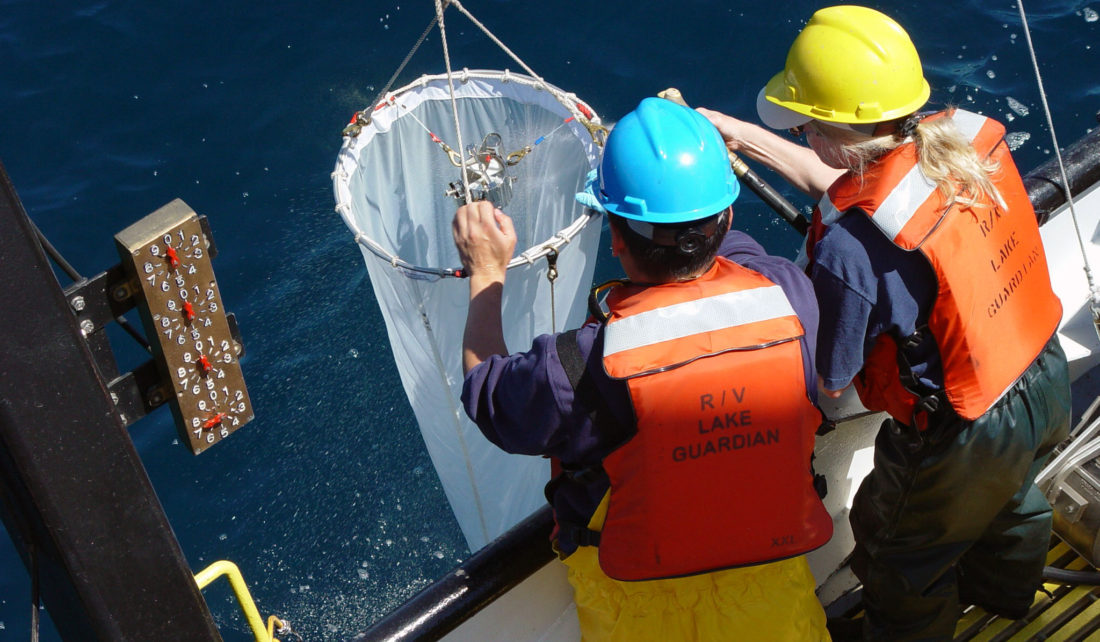
As 2020 comes to an end, we say good-bye to a long and challenging year, to say the least. We’ve all coped with changes and losses, large and small, as we’ve lived through this pandemic.
Like everyone, Illinois-Indiana Sea Grant (IISG) has worked to adapt. We’ve also sought out ways to provide support for our stakeholders to adapt in these times. We developed initiatives to help aquaculture producers and charter fishermen find new ways to be successful. And we’ve helped teachers pivot to online learning with new resources and opportunities, including our Scientist to Student program that uses video chats to bring scientists into students’ homes to talk about the Great Lakes and related science.
In 2020, our podcast, Teach Me About the Great Lakes, kicked into high gear. As the year took its many turns, Stuart Carlton worked to make the conversations relevant to our lives. He talked to experts about spending time in nature while we live with the threat of COVID-19 and actively brought a more diverse group of Great Lakes scientists into the podcast conversations.
Late in the year, IISG, together with Purdue Extension and the university’s Department of Forestry and Natural Resources, launched a new podcast series. Mitch Zischke and Megan Gunn are co-hosting Pond University, covering related topics such as habitat, fish stocking, vegetation control and construction, and will feature conversations with aquatic scientists, landowners and pond professionals.
Related to another issue of elevated concern, we held a series of workshops for resource managers and community leaders in the southern Lake Michigan region to discuss the lake’s record-breaking high water level and extreme water level variability in the last decade. The group ended the meetings with enthusiasm for further discussion and a list of available and needed resources.
As we look to the new year, it brings new opportunities, as always, but also a chance to make up for some of this year’s setbacks.
First of all, two IISG specialists moved on to other opportunities in 2020 and their professionalism and enthusiasm are very much missed. Jay Beugly was responsible for our buoys—their upkeep, installation and removal each year. But he also worked as an aquatic ecologist who engaged students in learning about fish in local waterways. Caitie Nigrelli is a social scientist who provided critical outreach to Great Lakes Areas of Concern communities undergoing the cleanup process. Before she left, Caitie developed a new position to assist in these efforts. Now, the process is ongoing to fill all three of these openings. What’s more, we are accepting applications for an associate director for the program, situated at the University of Illinois.
This year was scheduled to be a big year for Lake Michigan research through the Cooperative Science and Monitoring Initiative, which brings together scientists from around the Great Lakes to focus on one lake each year. This research and monitoring effort didn’t happen in 2020, but some studies will take place in the coming year after all, making for a busy field season on Lake Michigan and Lake Superior.
Speaking of research, a new study carried out by three Sea Grant scientists, including our Carolyn Foley, found that Sea Grant-supported research is consistently published in high quality journals and is frequently cited in local, regional and international publications. We continue supporting research relevant to our region, so this week we announce our new Request for Proposals with a particular focus on local food—specifically, fish and seafood—as well as changing lake levels, water safety and many other Great Lakes issues.
We are also expanding our research funding opportunities. In the coming year, we expect to release a request for applications to a new Graduate Student Scholars program. Current graduate students in Illinois and Indiana will be able to apply for funding to expand their research and will have opportunities to learn from Sea Grant specialists about a variety of topics related to effective outreach and communication.
With hope for better days soon, we wish you happy holidays!
Tomas Höök
Director, Illinois-Indiana Sea Grant
Illinois-Indiana Sea Grant is a part of University of Illinois Extension and Purdue Extension.

